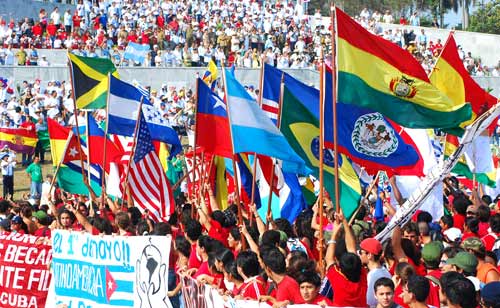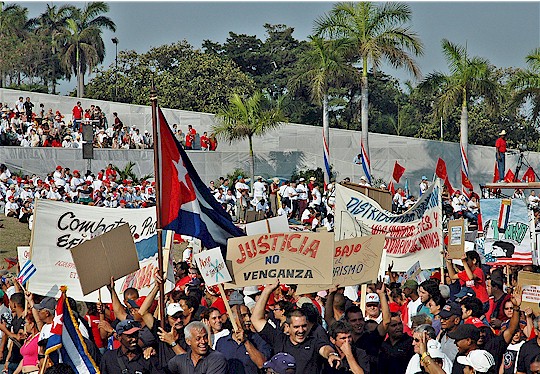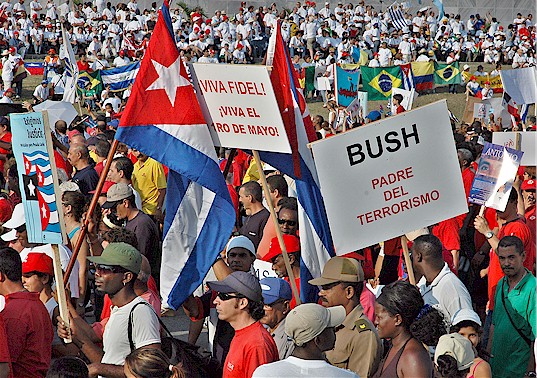It is imperative to inmediately have an energy revolution...
posted by F Espinoza | 01.05.2007 20:45 | Analysis | Globalisation



IT IS IMPERATIVE TO IMMEDIATELY HAVE AN ENERGY REVOLUTION
I hold nothing against Brazil, even thought to more than a few Brazilians continuously bombarded with the most diverse arguments, which can be confusing even for people who have traditionally been friendly to Cuba, we might sound callous and careless about hurting that country’s net income of hard currency. However, for me to keep silent would be to opt between the idea of a world tragedy and a presumed benefit for the people of that great nation.
I do not blame Lula and the Brazilians for the objective laws which have governed the history of our species. Only seven thousand years have passed since the human being has left his tangible mark on what has come to be a civilization immensely rich in culture and technical knowledge. Advances have not been achieved at the same time or in the same geographical latitudes. It can be said that due to the apparent enormity of our planet, quite often the existence of one or another civilization was unknown. Never in thousands of years had the human being lived in cities with twenty million inhabitants such as Sao Paulo or Mexico City, or in urban communities such as Paris, Madrid, Berlin and others who see trains speeding by on rails and air cushions, at speeds of more than 250 miles an hour.
At the time of Christopher Columbus, barely 500 years ago, some of these cities did not exist or they had populations that did not exceed several tens of thousands. Nobody used one single kilowatt to light their home. Possibly, the population of the world then was not more than 500 million. We know that in 1830, world population reached the first billion mark, one hundred and thirty years later it multiplied by three, and forty-six years later the total number of inhabitants on the planet had grown to 6.5 billion; the immense majority of these were poor, having to share their food with domestic animals and from now on with biofuels.
Humanity did not then have all the advances in computers and means of communication that we have today, even though the first atomic bombs had already been detonated over two large human communities, in a brutal act of terrorism against a defenseless civilian population, for reasons that were strictly political.
Today, the world has tens of thousands of nuclear bombs that are fifty times as powerful, with carriers that are several times faster than the speed of sound and having absolute precision; our sophisticated species could destroy itself with them. At the end of World War II, fought by the peoples against fascism, a new power emerged that took over the world and imposed the absolutist and cruel order under which we live today.
Before Bush’s trip to Brazil, the leader of the empire decided that corn and other foodstuffs would be suitable raw material for the production of biofuels. For his part, Lula stated that Brazil could supply as much biofuel as necessary from sugar cane; he saw in this formula a possibility for the future of the Third World, and the only problem left to solve would be to improve the living conditions of the sugarcane workers. He was well aware –and he said it-- that the United States should in turn lift the custom tariffs and the subsidies affecting ethanol exports to that country.
Bush replied that custom tariffs and subsidies to the growers were untouchable in a country such as the United States, which is the first world producer of ethanol from corn.
The large American transnationals, which produce this biofuel investing tens of billion dollars at an accelerated pace, had demanded from the imperial leader the distribution in the American market of no less than thirty-five billions (35,000,000,000) of gallons of this fuel every year. The combination of protective tariffs and real subsidies would raise that figure to almost one hundred billion dollars each year.
Insatiable in its demand, the empire had flung into the world the slogan of producing biofuels in order to liberate the United States, the world’s supreme energy consumer, from all external dependency on hydrocarbons.
History shows that sugar as a single crop was closely associated with the enslaving of Africans, forcibly uprooted from their natural communities, and brought to Cuba, Haiti and other Caribbean islands. In Brazil, the exact same thing happened in the growing of sugar cane.
Today, in that country, almost 80% of sugar cane is cut by hand. Sources and studies made by Brazilian researchers affirm that a sugarcane cutter, a piece-work laborer, must produce no less than twelve tons in order to meet basic needs. This worker needs to perform 36,630 flexing movements with his legs, make small trips 800 times carrying 15 kilos of cane in his arms and walk 8,800 meters in his chores. He loses an average of 8 liters of water every day. Only by burning cane can this productivity per man be achieved. Cane cut by hand or by machines is usually burned to protect people from nasty bites and especially to increase productivity. Even though the established norm for a working day is from 8 in the morning until 5 in the afternoon, this type of piece-work cane cutting tends to go on for a 12 hour working day. The temperature will at times rise to 45 degrees centigrade by noon.
I have cut cane myself more than once as a moral duty, as have many other comrade leaders of the country. I remember August of 1969. I chose a place close to the capital. I moved there very early every day. It was not burned cane but green cane, an early variety and high in agricultural and industrial yield. I would cut for four hours non-stop. Somebody else would be sharpening the machete. I consistently produced a minimum of 3.4 tons per day. Then I would shower, calmly have some lunch and take a break in a place nearby. I earned several coupons in the famous harvest of 1970. I had just turned 44 then. The rest of the time, until bedtime, I worked at my revolutionary duties. I stopped my personal efforts after I wounded my left foot. The sharpened machete had sliced through my protective boot. The national goal was 10 million tons of sugar and approximately 4 million tons of molasses as by-product. We never reached that goal, although we came close.
The USSR had not disappeared; that seemed impossible. The Special Period, which took us to a struggle for survival and to economic inequalities with their inherent elements of corruption, had not yet begun. Imperialism believed that the time had come to finish off the Revolution. It is also fair to recognize that during years of bonanza we wasted resources and our idealism ran high along with the dreams accompanying our heroic process.
The great agricultural yields of the United States were achieved by rotating the gramineae (corn, wheat, oats, millet and other similar grains) with the legumes (soy, alfalfa, beans, etc.). These contribute nitrogen and organic material to the soil. The corn crop yield in the United States in 2005, according to FAO (Food and Agriculture Organization of the United Nations) data was 9.3 tons per hectare.
In Brazil they only obtain 3 tons of this same grain in the same area. The total production registered by this sister nation that year was thirty-four million six hundred thousand tons, consumed internally as food. It cannot contribute corn to the world market.
The prices for this grain, the staple diet in numerous countries of the region, have almost doubled. What will happen when hundreds of millions of tons of corn are redirected towards the production of biofuel? And I rather not mention the amounts of wheat, millet, oats, barley, sorghum and other cereals that industrialized countries will use as a source of fuel for its engines.
Add to this that it is very difficult for Brazil to rotate corn and legumes. Of the Brazilian states traditionally producing corn, eight are responsible for ninety percent of production: Paraná, Minas Gerais, Sao Paulo, Goiás, Mato Grosso, Rio Grande do Sul, Santa Catarina y Mato Grosso do Sul. On the other hand, 60% of sugar cane production, a grain that cannot be rotated with other crops, takes place in four states: Sao Paulo, Paraná, Pernambuco and Alagoas.
The engines of tractors, harvesters and the heavy machinery required to mechanize the harvest would use growing amounts of hydrocarbons. The increase of mechanization would not help in the prevention of global warming, something which has been proven by experts who have measured annual temperatures for the last 150 years.
Brazil does produce an excellent food that is especially rich in protein: soy, fifty million one hundred and fifteen thousand (50,115,000) tons. It consumes almost 23 million tons and exports twenty-seven million three hundred thousand (27,300,000). Is it perhaps that a large part of this soy will be converted to biofuel?
As it is, the producers of beef cattle are beginning to complain that grazing land is being transformed into sugarcane fields.
The former Agriculture Minister of Brazil, Roberto Rodrigues, an important advocate for the current government position, --and today a co-president of the Inter American Ethanol Commission created in 2006 following an agreement with the state of Florida and the Inter American Development Bank (IDB) to promote the use of biofuel on the American continent-- declared that the program to mechanize the sugarcane harvest does not create more jobs, but on the contrary it would produce a surplus of non-qualified manpower.
We know that the poorest workers from various states are the ones who gravitate towards cane cutting out of necessity. Sometimes, they must spend many months away from their families. That is what happened in Cuba until the triumph of the Revolution, when the cutting and hauling of sugarcane was done by hand, and mechanized cultivation or transportation hardly existed. With the demise of the brutal system forced on our society the cane-cutters, massively taught to read and write, abandoned their wanderings in a few years and it became necessary to replace them with hundreds of thousands of voluntary workers.
Add to this the latest report by the United Nations about climate change, affirming what would happen in South America with the water from the glaciers and the Amazon water basin as the temperature of the atmosphere continue to rise.
Nothing could prevent American and European capital from funding the production of biofuels. They could even send the funds as gifts to Brazil and Latin America. The United States, Europe and the other industrialized countries would save more than one hundred and forty billion dollars each year, without having to worry about the consequences for the climate and the hunger which would affect the countries of the Third World in the first place. They would always be left with enough money for biofuels and to acquire the little food available on the world market at any price.
It is imperative to immediately have an energy revolution that consists not only in replacing all the incandescent light bulbs, but also in massively recycling all domestic, commercial, industrial, transport and socially used electric appliances that require two and three times more energy with their previous technologies.
It hurts to think that 10 billion tons of fossil fuel is consumed every year. This means that each year we waste what it took nature a million years to create. National industries are faced with enormous challenges, including the reduction of unemployment. Thus we could gain a bit of time.
Another risk of a different nature facing the world is an economic recession in the United States. In the past few days, the dollar has broken records at losing value. On the other hand, every country has most of its reserves in convertible currencies precisely in this paper currency and in American bonds.
Tomorrow, May Day is a good day to bring these reflections to the workers and to all the poor of the world. At the same time we should protest against something incredible and humiliating that has just occurred: the liberation of a terrorist monster, exactly when we are celebrating the 46th Anniversary of the Revolutionary Victory at the Bay of Pigs.
Prison for the assassin!
Freedom for the Five Cuban Heroes!
Fidel Castro Ruz
April 30, 2007
6:34 p.m.
posted by F Espinoza
Comments
Display the following comment